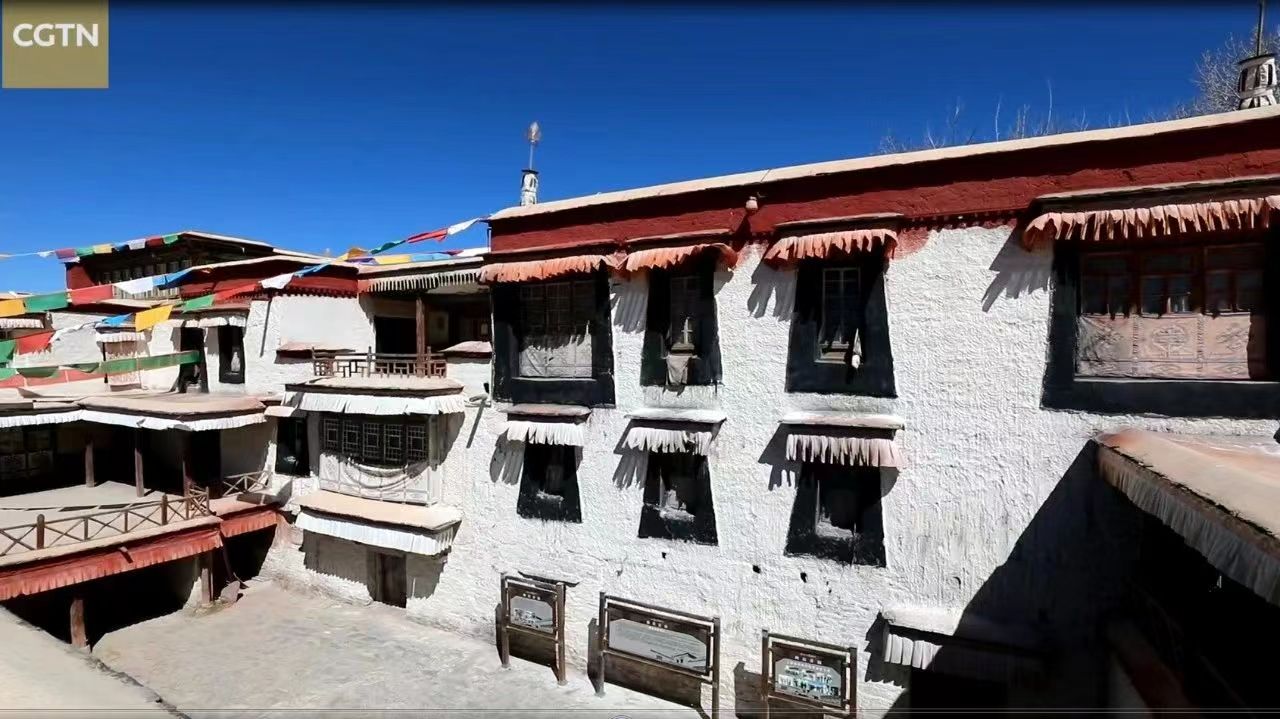How human rights have progressed in Xizang

Palha manor in China's Xizang Autonomous Region is the only remaining aristocratic manor in the region. Kept in its original shape, the manor-turned-museum is a vivid presentation of how luxurious life was for the masters in the past.
By contrast, 90 percent of residents who lived in neighboring villages were serfs owned by the masters and lived a life that couldn't reach the level of livestock.
Dawa Chosphel, a resident from Bainjig Lhunbo Village, remembers that his grandparents and parents, who were serfs at the Palha manor, had to do intense manual labor day and night throughout the year.
"At that time, life was tough," he told CGTN.
Change began in 1959, when the Chinese central government dissolved the aristocratic local government of Xizang and freed more than 1 million serfs, making them the masters of the nation and society.
The village continued to thrive under a series of policies issued by the central government and has become a model village in the region with a modernized agricultural industry combining tourism and culture. What is more impressive is that 89 percent of the villagers have attended college.
"Now life is more prosperous, much better than before ... Their (serfs) current houses are taller and better than the ones their previous master had," said Pubu Tsering, a tour guide of Palha manor.
'They embraced freedom for the first time'
The transformation of lifestyle of villagers in Bainjig Lhunbo is a classic example of how 1 million Xizang serfs obtained their due rights after being emancipated as of March 28, 1959.
In 2009, the regional legislature even announced March 28 as the day to commemorate the historical event.
"The emancipation of more than 1 million serfs is undoubtedly the most profound social reform in Xizang's history, and a landmark of foundational significance in the history of human rights in the region," said Ma Cheng, executive director of the Human Rights Research Center of the Northwest University of Political Science and Law.
"Human rights means that a human being must be at first treated as a human being," Ma, who attended a side event of the ongoing 55th session of the United Nations Human Rights Council in Geneva, told CGTN. As the serfs broke the shackles and were able to decide their own destiny, "they embraced freedom for the first time, and henceforth became the real sense of human beings."
Earthshaking changes
Ma noted that Xizang has gone through a process of earthshaking transformation from an extremely backward medieval status to a new Xizang featured with Chinese modernization.
Before 1949, Xizang had long been a feudal serfdom under theocracy and the dictatorship of monks and nobles. Serf owners, who accounted for less than 5 percent of the total population, owned all the arable land, pastures, forests, mountains and rivers, and most of the livestock in the region.
"The darkness and cruelty in Xizang at that time was worse than that of serfdom in medieval Europe," said Ma.
Ma pointed out several major events in the cause of human rights development in Xizang except for the 1959's serf emancipation.
The peaceful liberation of Xizang after an agreement signed by the Chinese central government and local government of Xizang in March 1951 enabled the people of Xizang to break free from the fetters of invading imperialism for good, embarking on a bright road of unity, progress and development with all the other ethnic groups in China.
In 1965, the Xizang Autonomous Region was founded and its People's Committee was elected. Since then, the system of regional ethnic autonomy has been fully implemented in the region.
Entering the new era following the 18th National Congress of the Communist Party of China (CPC) in 2012, a series of special preferential policies were enacted benefiting all ethnic groups in Xizang, including instructions to strengthen ethnic unity, and build a beautiful Xizang.
Under the leadership of the CPC, the officials and people in Xizang have worked diligently with one heart and one mind to resolve many long-standing and troublesome problems, and achieved many notable successes that were unimaginable in the past.
Before 1959, the average life expectancy in Xizang was only 35.5 years. The figure rose to 72.19 years in 2023. The regional GDP reached 239.3 billion yuan (about $33 billion) in 2023, representing a giant leap from the 1959 figure of a mere 174 million yuan.
"Over the past 75 years, Xizang has made remarkable progress in economic development and human rights, and the central government's strategy for administering Xizang has won universal support from the people of all ethnic groups in the region," Ma said.
He noted that however, several external forces, have kept distorting the history of Xizang and fabricating facts under the disguise of human rights to confuse public opinion and discredit the Chinese government.
"Rumors end with wisdom. I suggest that international friends who really care about China's development and the human rights cause in Xizang to come to the region and take a look. You will certainly have a real feeling," said the expert.
位于中国西藏自治区的帕尔哈庄园是该地区仅存的贵族庄园。庄园改建成的博物馆保持着原貌,生动地展示了主人过去的奢华生活。
相比之下,居住在附近村庄的90%的居民都是主人的农奴,他们的生活连牲畜的水平都达不到。
白吉伦布村的居民达瓦-乔斯皮尔回忆说,他的祖父母和父母都是帕尔哈庄园的农奴,一年四季都要没日没夜地从事高强度的体力劳动。
他告诉CGTN:“那时候,生活很艰苦。”
变化始于1959年,当时中国中央政府解散了西藏的贵族地方政府,解放了100多万农奴,使他们成为国家和社会的主人。
在中央政府出台的一系列政策下,西藏村继续蓬勃发展,成为该地区集旅游和文化于一体的现代化农业示范村。更令人刮目相看的是,89%的村民都上了大学。
“现在生活富裕了,比以前好多了......。”帕尔哈庄园的导游普布次仁说:“他们(农奴)现在的房子比以前主人的房子更高更好。”
‘他们第一次拥抱自由’
白济各伦布村村民生活方式的转变,是1959年3月28日西藏100万农奴获得解放后应有权利的典型例证。
2009年,自治区立法机关甚至宣布3月28日为这一历史事件的纪念日。
“100多万农奴的解放,无疑是西藏历史上最深刻的社会变革,也是该地区人权史上具有奠基意义的里程碑。”西北政法大学人权研究中心执行主任马成说。
马成参加了正在日内瓦举行的联合国人权理事会第55届会议的会外活动,他对中国国际电视台记者说:“人权意味着首先要把人当作人来对待。农奴打破枷锁,能够决定自己的命运,“他们第一次拥抱了自由,从此成为真正意义上的人。”
翻天覆地的变化
马成指出,西藏经历了从中世纪极端落后的状态到以中国现代化为特征的新西藏的震撼性转变过程。
1949年以前,西藏长期处于神权统治和僧侣贵族专政下的封建农奴制社会。占总人口不到5%的农奴主拥有该地区所有的耕地、草场、森林、山川河流和大部分牲畜。
马成说:“当时西藏的黑暗和残酷程度比中世纪欧洲的农奴制还要严重。”
马成指出,除了1959年的农奴解放,西藏人权发展事业还发生了几件大事。
1951年3月,中国中央政府与西藏地方政府签订协议,西藏和平解放,西藏人民从此摆脱了帝国主义侵略的束缚,走上了与全国各族人民团结、进步、发展的光明大道。
1965年,西藏自治区成立,选举产生了自治区人民委员会。从此,民族区域自治制度在全区全面推行。
2012年党的十八大召开后,进入新时期,一系列惠及西藏各族人民的特殊优惠政策相继出台,其中包括加强民族团结、建设美丽西藏的指示。
在中国共产党的领导下,西藏干部群众同心同德、艰苦奋斗,解决了许多长期困扰的难题,取得了许多过去难以想象的显著成就。
1959年以前,西藏人的平均寿命只有35.5岁。到2023年,这一数字上升到72.19岁。2023年,地区生产总值达到2393亿元(约330亿美元),与1959年的1.74亿元相比,实现了巨大飞跃。
马成说:“75年来,西藏在经济发展和人权方面取得了令人瞩目的进步,中央政府管理西藏的战略赢得了全区各族人民的普遍支持。”
他指出,然而,一些外部势力打着人权的幌子,不断歪曲西藏历史,捏造事实,混淆视听,诋毁中国政府。
"谣言止于智者。我建议真正关心中国发展、关心西藏人权事业的国际友人到西藏来看看。你们一定会有真实的感受。”